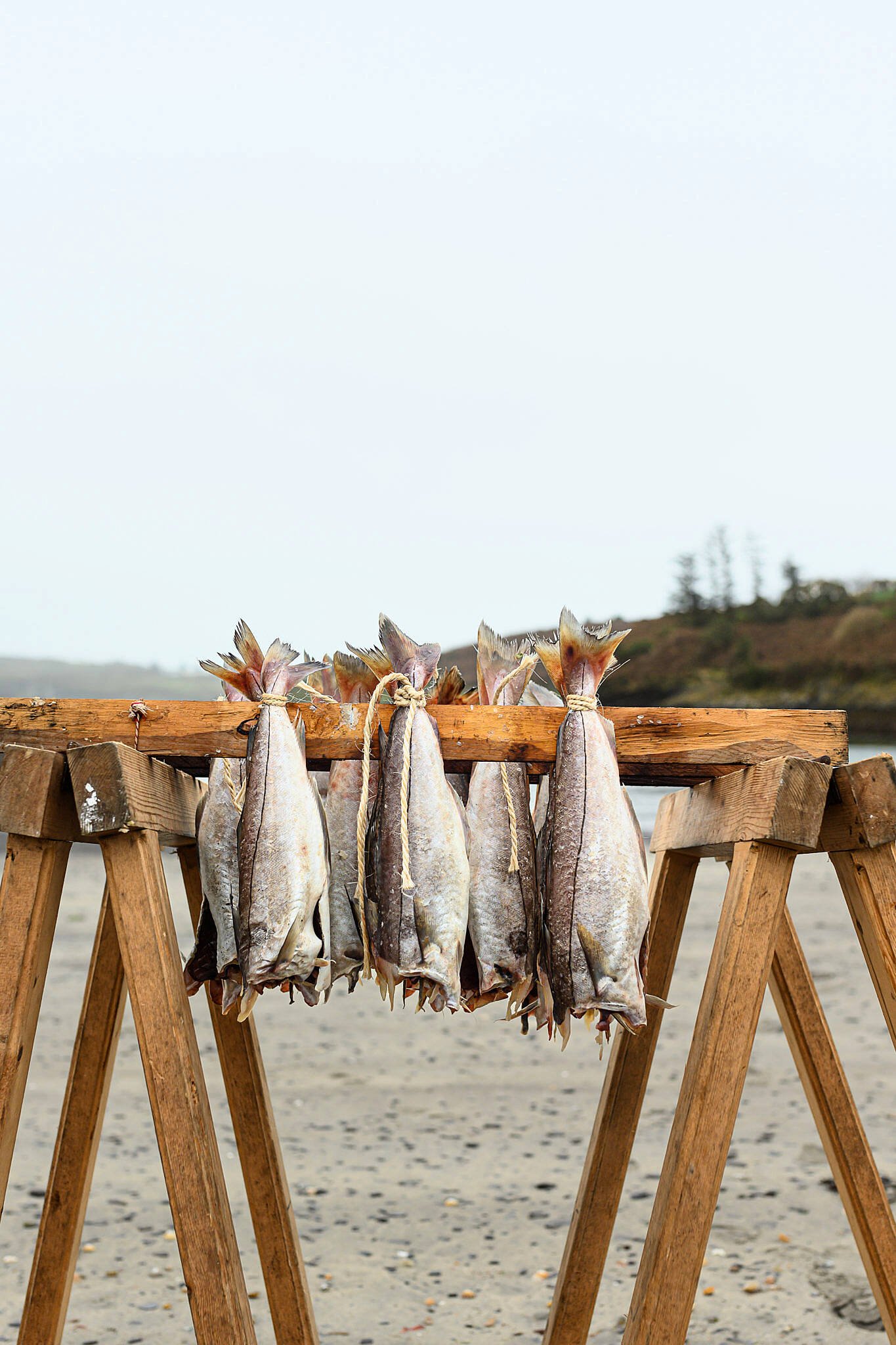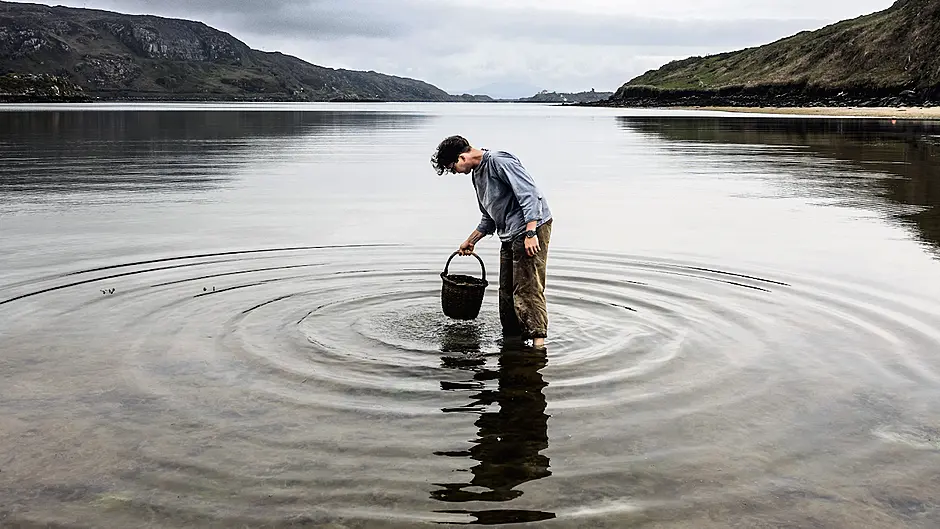Fish, shellfish, seaweeds and coastal forage for too long have been held up as foods of last resort, penitential foods or associated with famine.
This article was featured in our West Fork 2025 magazine – you can read the full supplement here!
BY KATE RYAN
But for a new generation, there is a revival of interest in the world-class seafood available on our doorstep, and greater knowledge of the nutritional value of seaweeds – our original superfood.
However, indigenous knowledge of these foods – how they sustained communities; preservation techniques as old as time – is eroding as how we source the food we eat moves away from self-reliance to a reliance on convenience.
Max Jones of ‘Up There The Last’ came to Ireland in 2017 to learn the ancient techniques of fish curing and smoking from Sally Barnes of Woodcock Smokery.
Max’s early career was shaped by a fascination with the art of cheese maturation, working for several years as a Neal’s Yard Dairy affineur.
It sparked a passion for traditional dairying practices, particularly those found in the foothills and mountains of the Italian Alps where his mother was born and raised.
That same drive for learning deepened when he came to West Cork to master the art of fish curing and smoking.
As a food conservationist, Max created Up There The Last to celebrate foods made in fringe communities around the world.
It has found a permanent home in West Cork with The Booley at Myross Wood in Leap, his centre for sharing knowledge gathered over years.
From here Max runs workshops and events under the dual banners of Traditions of the Sea and Traditions of the Land.
While the former continues Max’s love of dairying traditions, in particular the use of raw milk to make butter and cheese, the latter has spurred a kind of revival in old coastal practices that are all but extinct such as cockle raking, hand diving for scallops and spearfishing for spider crabs.
Max explains why these traditions of the sea are important to keep alive.
‘When people come to a Traditions of the Sea workshop or week-long retreat, it’s not just me telling people about the problems we face, the disasters we’ve caused and the effects that’s had on how and where we get our food. It’s more about showing there is this way of existing in nature with a very sensible human approach.
‘I love that people come along to learn raking for cockles. They take a rake, I tell them how to find cockles, how to cook them, what time of year to go cockle raking and why, and then lovely conversations start. If I can bring people into the water to see fish, scallops and spider crabs underwater, they experience something tangible in a world of Instagram,’ says Max.
‘So yeah, let’s just go and get some cockles because they’re right there and cook them up. Let’s smoke some fish in a barrel in the sand and explain what’s happening. Explain how fermentation and salting are all safety mechanisms established long before chemicals or plastics. I love to show what I’ve learned over the years and what I find fascinating. I genuinely feel like I have some kind of superpower and that everybody is capable of it. That’s what I’m trying to share with people.’
Traditions of the Sea is a mix of immersive participatory events, feasts and a travelling Community Smokehouse which has popped up at Skibbereen Farmers’ Market, at pier- sides and events over the past couple of years.
The portable barrel smokehouse is as much an open invitation to bring different foods to smoke in it (butter, cheese, brined fish and hams are some items brought for communal smoking) as they are a chance for people to take a seat and a cuppa and talk about lost and re-remembered food traditions once practised at home.

But it is Max’s Coastal Feasts that are perhaps both the most ephemeral yet connected experiences, so popular they sell out time and again.
‘Something in me wanted to smoke fish in the sand so as people are arriving to eat that food there is the sound of the sea, the smell of the sea, the smell of the smoke, your feet in the sand and it’s all very elemental.
‘None of the food at a feast has been in any kind of shop or trade and is just totally from the land and sea. I’ll make the butter, serve potatoes grown by friends; I’ll forage for samphire or sea beet as our greens. Often the wood we burn for cooking is from somebody’s garden, and I might be spearfishing for mullet, and it’s been delicious.
‘Being outside that system is exciting to me. We get to eat this food which is totally untouched by us and connects us to the fish and landscape as though we’re becoming the landscape by eating this food. I’m always asking: How can I cook here using what is from here in a way that would have been done here to make me feel as connected to here as I can? It’s wonderfully liberating.
‘When we look at the incredible larder of wild foods and ingredients in their natural state,’ says Max, ‘it demands of us to take responsibility for the foods we choose to feed ourselves with. In doing that, we become the place where we live, and there is no stronger connection to where you are than actually becoming the place through its eating.’
Upcoming coastal events with Up There The Last
Sea Traditions Dinner, August 2nd & 28th and Traditions of the Sea Feast, August 13th, €95pp. Long table feasts on the beach eating freshly smoked wild seafood, potatoes, butter and greens.
Sea Picking Workshop, August 23rd, €165pp. Learn how to forage, gather and cook wild shellfish and sea greens in this day-long coastal experience.
West Cork Smokies Workshop, August 16th, €185pp. Inspired by the origins of the famous Arbroath Smokies of Scotland, learn to make your own West Cork Smokies using wild fish from ocean waters, salt and smoke.
Visit www.uptherethelast.com for latest events, workshops and more on Traditions of Sea and Land.
This article was featured in our West Fork 2025 magazine – you can read the full supplement here!







